Everytime I feel larger than life,
You set me down,
Put me back to where I belong.
Everytime I walk on air,
You nasty thing,
pull me down, will you?
Fate, I'll get even with you, someday...
Thursday, January 19, 2006
Sunday, January 15, 2006
Sunday, January 08, 2006
Travelogue Part 3 - Kaziranga
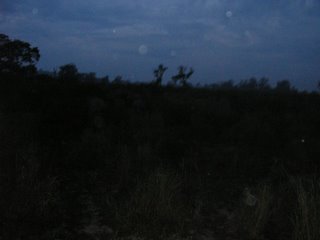
It feels strange on elephant back, towering over the rest of the animal kingdom. For the last 15 minutes we have waddled through blades of elephant grass that are so tall that they come all the way up to my waist, even though I am seated atop the elephant. Daylight hasn’t broken into the sanctity of the quiet night and the forest is a blur of ghostlike images, almost magical in the moonlight. The mahout (handler) of the elephant soundlessly guides the elephant to the right, but it all looks like acres and acres of elephant grass with some trees, here and there, reaching out to the sky like outstretched hands of a man buried under the swampy land trying desperately to come out. The mahout tells me that they burn the grass in springtime so that new grass can grow. Until then it is so easy to be lost here.
A solitary owl ensconced on a tree is surveying the forest. It looks at me with sharp eyes, as though to question me, “What brings you here?” Suddenly the forest is abuzz with noise. The high pitched “caw caw” of birds that I cannot see. We hear some wings fluttering. It is like a burglar alarm that just went off, and the forest is now aware of us. After a while it is silent again. The elephant waddles on into a small pond of water, unperturbed by all this. We sight a herd of wild elephants on the other side of the pond. The mahout tells me it is rare to spot a herd of wild elephants. We spot an elephant with beautiful long white tusks, and when it makes to move towards us it is a real cause for concern. Even the mahout straightens up, his face tense with concentration. But then the herd leaves to go and we move on.
It is then that the mahout points towards something moving in the bushes. We move towards it as fast as we can. The elephant expertly circles around it. The sun peeks at us from the east and the light shines through the bush and reveals two rhinos busy having breakfast. So this is the famous one-horned rhino from Kaziranga. Muscular and majestic. If it wanted to, it could ram into the elephant and knock us all down. Fearlessly the mahout moves in closer and furiously I work with the camera and gulp in as much of what I see, as I can.
The rhinos gaze back at us. The pair is not alone – there are more rhinos hidden in the bushes. The horns move up and the heads along with it. The rhinos won’t budge from their stance. The elephants hold their ground. The silent tussle continues for an eternity. It is a strange power struggle where so little is spoken but so much is said. I look on as the sun finally decides to emerge, shedding colorful light on an incredible scene, on an unforgettable day.


Wednesday, January 04, 2006
Travelogue Part 2 - Omnibus
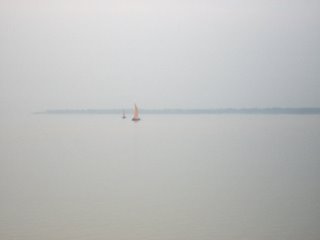
“What time does the bus leave?”
She looks up at me and sees a face that doesn’t quite fit in with the people in the bus, the squalid interiors of the bus and the city of Shillong outside. In her lap is a book of tickets in which she mechanically scribbles the amount and tears off the receipts. Around her, three locals stand in abeyance, awaiting her next order.
She replies absentmindedly, “The bus will leave now. And that will be 60 bucks”. She hands me the receipt as I fumble for the money in my wallet.
“Now? Do you mean right now?”
“Yes!” she replies and dismisses me from her thoughts with a wave of her hand. The bus ride to Guwahati is good business and one can’t waste one’s thoughts on nosey tourists such as me. I would be getting down at Jorabat (on the border of the states of Meghalaya and Assam) and then change buses to go to Kaziranga, Assam. On the map the road looks fairly easy to navigate and if I were to calculate distance and assume an average speed of 60 km per hour it works out that the total duration of my transit would be around 6 hours and I would be able to reach kaziranga by 3pm.
But the map doesn’t show hairpin bends and treacherous mountainous roads. Nor does it show elevation, proclivity and declivity.
The seat next to me, which is now occupied by a squint eyed gentleman with a stony sphinx-like face. The humming of the engine and the cool, fresh air of the mountains make my eyelids feel very heavy. Every now and then through the corner of my eyes I check if my backpack is still with me. I notice that the bus is now very crowded and the engine is sputtering like a dying man with internal injuries.
A few hours later I change buses. Now I am in Assam. The people look different. They speak a different tongue. The seats are cramped and nobody seems to understand English. The man next to me with a royal moustache and an all-knowing expression is looking at me with suspicion. I ask him about where I should get down. And he tells me so much more, in his broken English and charming style. He tells me about how he goes every weekend to meet his wife in Nagaon. About his work in Guwahati. The politics of Assam. The economy. His childhood. He just loves to talk and I to listen. When we get down at Nagaon (where I need to change a bus), he offers me a lift in a ‘cycle rickshaw’ and invites me to his home for tea. He even talks about meeting me in Mumbai and his business plans if I am ‘interested’. I thank him, as he writes me his phone number in a piece of paper and asks me to call him ‘anytime’. And then he waves at me from the ‘cycle-rickshaw’ for the last time I will ever see him.
The next bus I change into is even more cramped. Next to me is a hefty man and we can barely sit. I crane my neck out the window and gasp for fresh air. The child in the seat behind me won’t stop yelling. I am surrounded by a plethora of human beings piled up all around me. I can feel a hand near my neck and notice a small child squeeze between the seats and sit almost on my lap while I hold on to my backpack with my life. Somebody is stooping above me and I can feel the enormous pressure of the people around me that is trying to jettison me out of the bus through the narrow window. The bus crawls along like an old mule pulling a heavy load.
The cheerful man next to me is smiling despite all this. I venture to ask him when I would reach Kaziranga. And he tells me about his life and times, and his family problems and the wonderful history of Assam. The trouble is I can barely understand his language. But he speaks slowly and often repeats the words for me to help me understand. We get along fine. The language of human beings is so universal. The lives are so similar. The problems and issues are the same. Just minor adjustments here and there.
By the time I reach Kaziranga it is dark. My watch reads 6pm. The air is foggy, my body is aching and the memory of my co-passengers still lingers on.
From top - Two sail boats in the Bay of Bengal, Dida - my beautiful granny
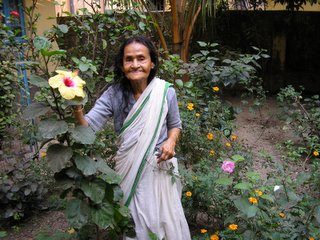
Monday, January 02, 2006
Travelogue Part 1 - Time Warp
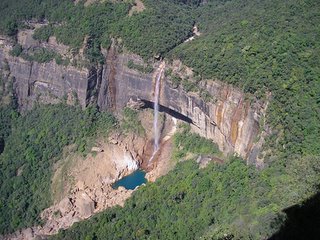
Time started to whiz past from the moment I landed in Guwahati. Every time I glanced at my watch I wondered how fast the minutes were disappearing. Even the winter sun was in a hurry to go down making it so difficult for me to stick to my plan of reaching Shillong before sunset and making good use of the remaining bit of light. The cab driver tried his best to help me. Like everything else he too was in a hurry – he wanted us to reach Shillong in time, dead or alive. But as fate would have it, when we reached the gloomy and sleepy town of Shillong, negotiating the many perilous bends and turns in a road that seemed to go straight up to heaven, it was already dark.
Determined to make amends for the lost time, I roused myself early next morning from the shady hotel room, and plunged straight into the chilly foggy morning outside. Reached the bus station before everybody else and booked a ticket to the mystical town of Cherrapunjee – the wettest place on planet earth with an average annual rainfall of 12000mm. Situated in the northeastern state of Meghalaya, India, Cherrapunjee is not half as crowded and popular as the capital city of Meghalaya, Shillong. Consequently it is a traveler’s delight especially in the month of December when it rains less and most people find it too cold to travel in Meghalaya.
Sometime later I was in a rickety bus, speeding to different nooks and corners in the mountains of Meghalaya. Every corner had a spectacular view and a very unpronounceable name in the Khasi language. I went to the dark and dank Mawsynram cave, the enchanting Nah Ko Likai falls, and numerous viewpoints, lakes and gardens. When I looked at them through binoculars, the villages in the hills of Meghalaya, appeared to be scattered randomly, with no motorable roads connecting them. They were blissful islands of human habitation, isolated and so aloof.
The beautiful people of Meghalaya like to spend their lives smiling at each other, chewing betel leaves. To them the world seems to be speeding away from one place to another, in a perpetual hurry. They merely look on and wonder why all this haste. I too had to leave the next day. So they smiled at me and said ‘Khublei’ (Khasi for ‘God Bless’).
From top - Nah Ko Likai falls, Mawsynram cave, A lake in Shillong
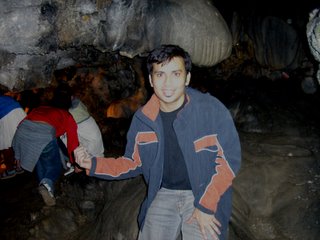

Subscribe to:
Posts (Atom)




